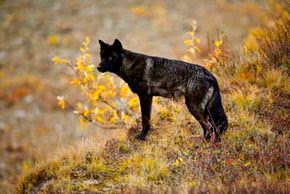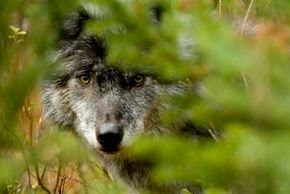Quck answer
A lone wolf is a term used to describe a person who prefers to act independently and does not seek the company of others. They often think and act differently from the mainstream, and may be viewed as outsiders. Lone wolves may be introverted or extroverted, but they share a common trait of self-reliance. They may have difficulty forming close relationships but can also be fiercely loyal to those they choose to associate with. While the term is often associated with negative connotations, it can also be used to describe those who are independent thinkers and have unique perspectives on life.
Wild Animals

Curious about what happens when a wolf leaves its pack? Find out more here.
John Eastcott and Yva Momatiuk/Getty Images
Wolves usually function like The Three Musketeers, with a “one-for-all, and all-for-one” mentality. Despite fighting and hierarchy, the bonds within these packs are strong. However, each individual wolf plays a unique role that contributes to the group’s survival.
The alpha male and female lead the pack, which also includes their offspring and sometimes a few other wolves. The beta wolf is the lieutenant of the crew, taking over if an alpha dies. Then, at the bottom of the pecking order, there’s the omega wolf. This wolf is the runt, subordinate to all other pack members, and provides comic relief. The pack’s dynamics are explained more thoroughly in What is a wolf pack mentality?
This strict hierarchy ensures that the pack operates efficiently. For example, lower-ranked wolves must display submissive body language, such as crouching if a dominant wolf approaches. Only alpha males and females will mate, except during times of prey abundance. Even during mealtime, there’s a specific etiquette, with alphas getting to choose the best meat or organs, while the omegas have to wait until the others have had their fill before scavenging for scraps.
Food is a crucial aspect of the pack’s organization. When tracking large prey, such as moose, strength in numbers is beneficial. However, the Ethiopian wolves in Africa often hunt smaller prey by themselves, even though they are on the verge of extinction. Wolf pack members help to preserve the food, and with multiple wolves dining, little goes to waste. The group setting also keeps scavengers away.
Being in a pack isn’t always easy. Contending with prey can cause serious injuries, such as broken bones and fractured skulls. Territorial disputes within packs can also lead to injury and death.
Just like the rigors of Army life may force a new recruit to quit during basic training, the regimentation of life in the pack can compel a wolf to leave. However, leaving the pack may be more challenging than staying. Check out the next page to learn more about what happens when a wolf becomes a lone wolf.
В
Dispersing Wolves

Lone wolves must be careful not to tread into enemy territory.
Robert Postma/Getty Images
A lone wolf is a wolf that has left its natal pack, or the pack it was born into. Wolf biologists call this process dispersal, which usually occurs between the ages of 1 and 2 years old, coinciding with sexual maturity.
One significant factor that causes a wolf to leave its pack is aggression from the dominant wolves. For instance, an omega wolf or a sickly alpha wolf that can no longer lead its pack may be bullied or physically challenged to the point of leaving the group. When food is scarce, weaker wolves may not receive adequate nutrition and may leave out of necessity.
Both male and female wolves have the ability to leave their packs, however, males may do so more frequently in certain areas like south-central Alaska. While wolves typically form packs and engage in social behavior, lone wolves are not common. Studies have shown that less than 15 percent of the world’s wolf population are dispersing wolves. Lone wolves are more prevalent in Europe where prey is smaller. Leaving the pack also means leaving behind the protection that other members provide. Lone wolves must be careful not to enter lands belonging to other packs. To find food, a lone wolf may have to search for hundreds of miles or float between pack territories. To avoid detection, a lone wolf limits its howling to avoid giving away its location. However, if a lone wolf gets lost from its pack, it will howl to signal its location. Dispersal does not always lead to loneliness. Younger lone wolves may challenge a weak alpha in another pack to take over. Lone wolves may also seek out breeding wolves from other packs, which helps to diversify the wolf population. If a lone wolf is unable to survive on its own, it may eventually return to its natal pack.
More Information Available
Related Articles
- Learn about wolves
- What is the pack mentality of wolves?
- Is it safe to live with wolves?
- Do wolves howl at the moon?
- Why are wolves coming back in the US?
- Discover how dogs work
- Explore animal migration
- Are dogs really man’s best friend?
- Learn about dog training
- Discover the world of sled dogs
More Useful Links
- International Wolf Center
- PBS Nova: Wild Wolves
- Animal Diversity Web: Canis Lupus
Sources
- Busch, Robert A. “The Wolf Almanac: A Celebration of Wolves and Their World.” Globe Pequot. 2007. (July 14, 2008) http://books.google.com/books?id=iUVJsGY9Q-8C
- Feldhamer, George A.; Thompson, Bruce Carlyle and Chapman, Joseph A. “Wild Mammals of North America: Biology, Management and Conservation.” JHU Press. 2003. (July 14, 2008) http://books.google.com/books?id=-xQalfqP7BcC
- Hogan, Jenny. “Lone wolf brings pack back from the brink.” The New Scientist. Nov. 20, 2002. (July 30, 2008) http://www.newscientist.com/article.ns?id=dn3081
- Lopez, Barry Holstun and Bauguess, John. “Of Wolves and Men.” Simon and Schuster. 2004. (July 14, 2008) http://books.google.com/books?id=-3FTLxW09K0C
- Mech, David L. and Boitani, Luigi. “Wolves: Behavior, Ecology, and Conservation.” University of Chicago Press. 2003. (July 16, 2008) http://books.google.com/books?id=_mXHuSSbiGgC
- Whitt, Chris. “Wolves: Life in the Pack.” Sterling Publishing Company, Inc. 2003. (July 16, 2008) http://books.google.com/books?id=x4DLA4TE_rAC
- Williams, Stuart. “Africa’s Lone Wolf.” National Wildlife Magazine. October/November 2005. (July 30, 2008) http://www.nwf.org/nationalwildlife/article.cfm?issueID=77&articleID=1115
FAQ
1. What is a lone wolf?
A lone wolf is a term used to describe an individual who prefers to operate alone rather than as part of a group. This term is often used in the context of social animals, such as wolves, who typically live in packs.
2. Why do some people choose to be lone wolves?
There can be many reasons why someone might choose to be a lone wolf. Some people may prefer to work alone because they feel that they can be more productive without the distractions of others. Others may simply enjoy the independence and freedom that comes with not having to answer to anyone else.
3. Are lone wolves typically introverted or extroverted?
While there is no one-size-fits-all answer to this question, many people who identify as lone wolves are often introverted. This is because introverts tend to prefer solitary activities and may find social interactions draining.
4. Is being a lone wolf a negative thing?
Not necessarily. While some people may view being a lone wolf as a negative trait, others see it as a positive attribute. For example, being a lone wolf may allow an individual to focus more on their own goals and achieve success in their chosen field.
5. Can lone wolves work well in a team environment?
Yes, absolutely. While lone wolves may prefer to work alone, they are still capable of functioning well in a team environment. In fact, their independent nature may make them valuable contributors to a team, as they may be able to bring fresh perspectives and ideas to the table.
6. Are there any downsides to being a lone wolf?
One potential downside to being a lone wolf is that it can be difficult to form meaningful relationships with others. Additionally, working alone can be isolating and may lead to feelings of loneliness or depression.
7. How can someone who is a lone wolf find a sense of community?
There are many ways that someone who identifies as a lone wolf can find a sense of community. For example, joining a club or organization that aligns with their interests can be a great way to meet like-minded individuals. Volunteering or participating in community events can also be a way to connect with others.
8. Can being a lone wolf be a sign of mental health issues?
Not necessarily. While some people who prefer to work alone may struggle with mental health issues, being a lone wolf in and of itself is not a sign of mental health problems.
9. Are there any famous lone wolves?
There are many examples of famous people who have been described as lone wolves. Some of these include Steve Jobs, J.D. Salinger, and Emily Dickinson.





Leave a Reply